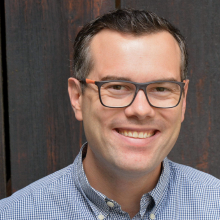"I'm really excited that I get the chance to set up my research group in such an interdisciplinary research atmosphere within SimTech. The University of Stuttgart with its strong background also in chemistry and materials science and the Max Planck institute's offer perfect connections for my research”, says Alexander Schlaich, Junior Research Group Leader for Multiscale Materials Modeling, on the occasion of his start at the beginning of January.
Born and grown up in Stuttgart, Alexander Schlaich studied Physics at the University of Stuttgart, where he received his Diploma in 2011. In 2012, he moved to Berlin to do his doctorate work with Roland Netz at the Freie Universität on surface interactions and friction in nano-confinement, where he defended his PhD in 2017. As a PostDoc he moved to Grenoble/France where he worked with Benoit Coasne at the Laboratoire Interdisciplinaire de Physique (Université Grenoble Alpes & CNRS) on molecular modeling of transport and adsorption in porous media. Since summer 2020, Alexander Schlaich is working as a senior PostDoc at the Institute for Computational Physics at the University of Stuttgart where he received the notification about his successfull application with SimTech.
“Within SimTech I hope to strengthen the field of molecular simulation that is mandatory to develop or verify data-driven approaches due to mechanistic insights that cannot be obtained from different approaches. On the other hand, I hope that the data-integrated approaches that are strong within SimTech applied to my simulations can unravel new and interesting underlying physical principles. I'm looking forward to get into closer touch with this wonderful scientific community”, underlines Schlaich his goals.
Alexander Schlaich employs computer simulations on a molecular scale to understand the interplay between micsocopic forces, adsorption, surface interactions and diffusion/transport. To this end such simulations are combined with advanced analysis methods and connected to statistical physics and classical thermodynamics and allow to bridge the interfaces between chemical physics, physical chemistry, material sciences and biology. In this interdisciplenary research area, Mr. Schlaich strongly connects simulation and theoretical approaches to experiments. With his nano-scale insights Mr. Schlaich wants not only to significantly advance the research in the Stuttgart Cluster of Excellence SimTech but he will also strongly integrate within the collaborative research centers SFB 1313 and SFB 1333 at the University of Stuttgart.
Welcome to SimTech!


